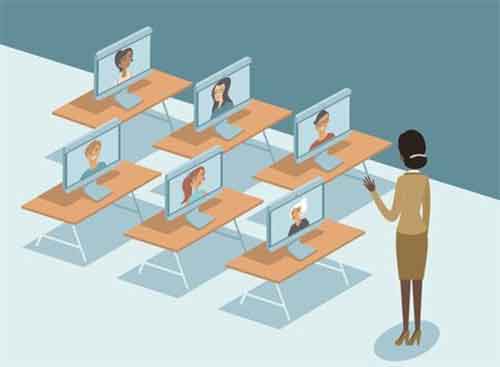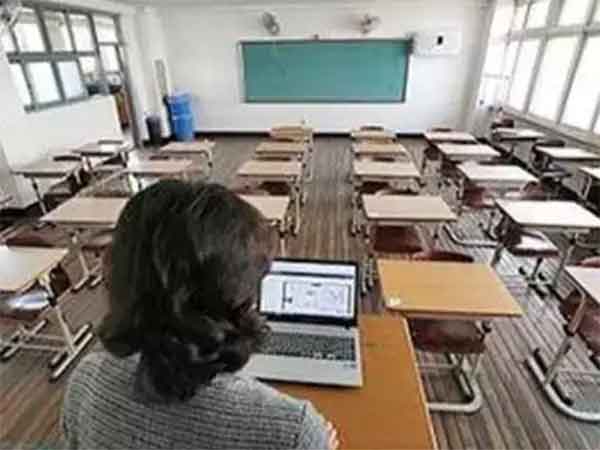by Chandreyee Goswami & Dhriti Sonowal

As students of social sciences, we often harbour a sense of enlightenment in knowing that the subject matter we engage with has been historically instituted to identify the varieties of social realities that individuals might find them in. The legacy of social sciences has been its deep inspection and understanding of the social world which is produced by living humans rather than the non-living physical world. A thriving intellectual community within the social sciences has contributed to the growth and reach of the various disciplines. However, over time there have also been dichotomies and a growing sense of indifference within the community which on many counts strives to produce knowledge about inequalities and power relations in the social world. This sense of indifference has become multifold today at a time when the whole world is battling with a pandemic. As educators and students we have been pushed into the brink of crisis, with the shutting down of universities, colleges and schools to arrest the spread of the virus. With this shut down of institutions, there was an almost immediate shift in the mode of operation of the educational institutions from physical classrooms to virtual classrooms. With schools, colleges and universities steering their students to ‘study from home’, finish their coursework online, sit for exams from home and even ‘graduate’ from home- it seems the transition to a “new normal” has taken a prompt digital path. This shift to the online mode has been massive and has generated various critical debates on the future of learning and evaluation and the transforming nature of pedagogic strategies. These debates are also being placed across the spectrum- questions of how access to education continues to be disproportionately placed with a select sections of educators and private institutions who can make smooth transitions from physical classrooms to ‘online’ classrooms as opposed to most public institutions which cannot afford a quick technological adaptability, to students who can afford to participate in online learning to those who cannot. As critical discourses are being churned about the changing social order, it’s interesting to note how we as practitioners of social sciences are placed within these very questions we are raising.
Home as the Epicenter of the New Normal:
As the pandemic has seemingly caused a disruption to our ‘regular’ lives, a virtual solution has been instituted in place to create a “new normal” of existing. This virtual solution however creates a structure which poses a prerequisite need for tools such as smart phones, computers, laptops and internet connection, which produces a strong digital dependency, the corollary of this dependency is the exclusion of a section of people who can’t afford these prerequisite tools. Besides the “digital divide”, this shift in the teaching and learning methods has also brought the focus on to the most private and intimate spheres of both educators and learners. Home has become the epicenter for work. The separation of work and home which was a feature of the modern capitalist world had been the norm. But now the personal, intimate space of home and family is shrinking. For many students they have had to continue their studies amidst these transitions at home. But home has different meanings for different individuals. While the home space becomes the centre of work in this new norm, there is an assumed acceptance of the “home” as a comfortable space which provides freedom for creativity. While it may be true for some, drawing generalisations would be highly flawed. Since individuals occupy different social realities, the reality of home differs from individual to individual. Home spaces can often be intervening spaces and also often act as sites of violence. Case in point would be the number of domestic violence incidents that have been on the rise during the lockdown. Even if a household posits as a non-intervening space, there does exist complex co-dependencies in co-residential households, with particular roles for each member which means that each student who participates in online classes operate from different social realities with varied circumstances at home. Therefore to assume that attending classes from home is an easy task would be disregarding the experiences of many students who come from vulnerable homes.
More Inequality, Less empathy- Are we listening to them?
The number of students who have had to lose out from participating actively or drop out of courses because they were unable to keep up with the requirements of the virtual platform of conducting academic activities is quite considerable. Internet connectivity is a major factor in the smooth conduction of online classes, the absence of which proves to be a hurdle for many students in remote areas. These are not polemical arguments but are rooted in narratives of students Students enrolled in a masters programme at a regional university in the Northeastern region of India have had to constantly submit assignments which were not only difficult without consistent engagement in the classroom but with the additional requirement of internet facilities, laptop and know-how of creating google groups, zoom meeting schedules etc was also untenable for many where getting a strong internet alone is difficult. On the other hand, a prestigious programme at a private university which took no time to shift its coursework online saw students dropping out without completing their final term courses, again due to very practical problems of connectivity. These are a few narratives that we had collected in specific contexts but there are many such instances where each day we are contributing to the existing inequalities in the name of continuing academic lives and functions under the buzzword of the “new normal”.
The transitions being brought about the technological intrusion has been symbolic in many aspects. The virtual classrooms in Zoom and Google meet and such platforms have become an intrusive agent into the intimate and vulnerable space of the home. The phone and laptop camera becomes the medium through which an individual’s home space is opened for scrutiny. Although classrooms and university spaces had for good measure been able to provide a neutral space and were able to bridge certain inequalities that arise by providing a formal environment for learning, a shift to an online mode has revealed layers of inequalities. The online space has become a platform that reveals markers of class and privilege for some while laying bare the vulnerabilities for others. Hence, a shift to the online mode has not only created inequalities in terms of participation and non participation but has also unraveled symbolic aspects of inequality in participation. However, the quest for upward social mobility shapes aspirations for many students who see education as a sure shot way to move up the ladder of social hierarchy and achieve a position of security. Consequently, therefore, for most students and households, online platforms have become the only source of continuing education and hence in spite of difficulties and adjustments in accessing it, virtual education is being accepted as the new normal. This transformation in the structures of pedagogy means our aspirations are now being oriented to fit into this neo-normal paradigm of productivity and to suit its conditions. The number of webinars attended, papers presented in e-conferences, online certification courses completed have become the new yardsticks for being identified as productive students, scholars and academicians. It seems the pandemic has also unraveled how miserably we have failed as a community of social scientists to internalise the critical social theories of which we are proud proponents of and metamorphosize them into practice with our inability to empathise with each other.
Locating Social Science and its Community within the conundrum:
As members of the social scientific community, we would especially like to problematise the approach of our own fraternity with regard to the aforementioned discussion. We have been perplexed to witness how the rigor of the social sciences has come to be reduced to a one-dimensional, increasingly calculative and utilitarian exercise. Is it possible that the theories that have been instituted as tools to identify the multitude of social realities have become apathetic to the very ‘human experience’ it seeks to unpack? This transformation in the social sciences is not instant and the context within which this change operates is a market driven, competitive society where time is considered to be of utmost importance and our work cultures are oriented to fit in this perfectly ‘rational’ system of operation. But the irony runs deep to see an arena like social sciences-which through its critical engagement with the market claims to work towards unraveling the growing inequalities and discrimination caused by it, itself step into these very shoes. This dichotomous nature of social science is not a novel feature but there seems to be a reluctance to have a meaningful engagement and reflection of the internal lapses. Have we, the practitioners been evading this seemingly paradoxical reality which the social sciences have got itself entangled in? Or are we blinded by our quest to be in a rat race as “skilled” and “qualified” that we have stopped asking some pertinent questions about our disciplines and our practice?
Legacy of the Social Sciences: Are we doing justice to it today?
In the modern period, science has been placed on a pedestal because it can supposedly deliver ‘practical results’ which are exact and precise and not imaginary. Replacing theology and philosophy it led the world to achieve the unachievable, showing immense promise to humankind to be able to acquire mastery and control over everything. But amidst this over enthusiasm to know the infinite, the world was going through upheavals, first brought by French revolution and later enhanced by the industrial revolution. No amount of scientific progress, technological advancement and mathematical knowhow could explain why social relationships were changing. A need was felt to develop a branch of disciplines to fill in these gaps in the production and organisation of knowledge to reflect on the social and political transformations taking place in the world (Gulbenkian Commission 1996). This led to the emergence and institutionalisation of social science that was deemed as a form of knowledge embedded in the social realities and not distant from people’s lives (Gulbenkian Commission 1996).Notwithstanding its methodologies (the constant tussle between objectivity and subjectivity), the primary goal of social sciences is to systematically examine the veracity of different social realities, and not to invent or intuit (Gulbenkian Commission 1996). This is the beauty of social science and its pertinence in each society is that it teaches individuals to be more humane and gives hope for a better society.
But today, with this whole obsession with online education, has social science become absolutely distant from the multiple social realities in which people are ensconced? Borrowing from Emile Durkheim who argued that each society is intrinsically marked by both normality and pathology, we would like to argue that as social scientists, acknowledging and engaging with both norm and deviance is our responsibility as it brings us closer to the social realities (Durkheim 1895). However, instead of using this moment to analyse and understand how society continues to evolve through the dialectics of “normal” and “pathological” (Durkheim,1895), social scientists seemed to be more interested to contribute in the ‘neo-normalisation’ process that began as an aftermath to the pandemic. Consequently, what is increasingly becoming a norm is the notion of remaining ‘productive’ and academically relevant and visible. Feeling of guilt and fear of losing out has become more evident as soon as work shifts to the realm of domestic since it is stereotyped as an ‘unproductive’ realm in the capitalist world. Does it mean that we are falling into the same trap of the technocrats and corporates; becoming highly calculative, competitive, very one dimensional, growth driven and producing “solutions to technical problems” (Habermas 1994: 192)? Instead of asking questions that address the root causes of the problems that academics and the education system in particular is experiencing due to the pandemic, social scientists seems to be making a beeline to be a part of the new normal. Such an approach might eventually hinder the growth of the social sciences if it keeps reinforcing a single overarching truth. Failing to recognise that individuals are caught up in different and byzantine circumstances due to the pandemic and creating a spectacle out of social science through the virtual media is a tragedy of our times and in George Ritzer’s famous phrase, it is nothing but ‘irrationality of rationality.’(Ritzer, 1993: 157). Nothing can be more unfortunate for us as a community than roping social sciences away from its essence, the very basic principles which led to its emergence, sustenance and dissemination.
One may then ask, how should we pursue our studies, research and other academic engagements? Asking this question in this manner puts an end to any critical and creative solution that might have been possible in a situation of this kind. Whereas, if the question itself is reframed to ask- Whose education and future are we talking about? Can online presentations, webinars, Google meet classes be regarded as the only way forward when it puts a number of students’ academic lives at stake? When framed in this manner- it brings out the lacks in this new system immediately. It showcases the gross injustices not only to those who are unable to access the new platforms but also the injustice caused to the discipline and rigour of social sciences. Of everything else that we have learned from the legacy of the social sciences, a fact that stands true is that a majority of the discourses we know of have emerged in times of crisis or have emerged as critiques to periods of crisis in history. Having said that we have to be aware of the responsibility we are placed with as a community- we have to keep churning debates, discussions and work towards fostering criticality. Hence a practical concern that might be directed to us at this point would be that for critiques to be generated, intellectual activities must be carried on, and it must be done on the platforms made available to us through the active tinkering of technology. We cannot absolutely disregard the role of technology at this point but we can only hope we as a community can cultivate reflexivity as a serious intellectual exercise. Finally going back to the question we began with- can we afford to become non-reflexive scholars and academics that have become disjointed from the realities we are living in? If we fail to introspect at this important juncture of history then in no time social science would breed its own tradition of indifference and passivity.
References:
Bourdieu, Pierre and Loïc J.D. Wacquant. (1992): An Invitation to Reflexive Sociology, UK: Polity Press
Durkhiem, Emile. (1895): The Rules Of Sociological Method, New York: The Free Press.
Report of the Gulbenkian Commission on the Restructuring of the Social Sciences (1996): “Open the Social Sciences”, USA: Stanford University Press.
Ritzer, George. (2019):The McDonaldization of Society into the Digital Age, Thousand Oaks, California: Sage
Dhriti Sonowal ([email protected]), is a research scholar at the Centre for the Studies of Social Systems, Jawaharlal Nehru University, Delhi.
Chandreyee Goswami ([email protected]),is a provisional doctoral candidate at the Department of Social Anthropology, University of Edinburgh,Scotland.
SIGN UP FOR COUNTERCURRENTS DAILY NEWSLETTER













































